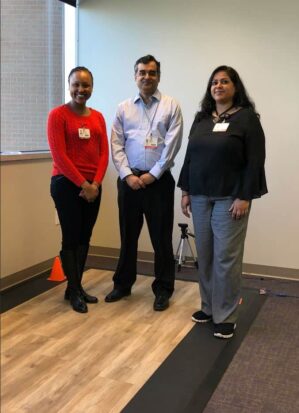Tuhin Virmani, M.D., Ph.D.
 Associate Professor, Director of Movement Disorders Program
Associate Professor, Director of Movement Disorders Program
Department of Neurology
Education
- Fellowship – Columbia University School of Medicine
- Internship and Residency – Washington University School of Medicine
- Medical School – University of Texas Southwestern Medical Center
Professional Certifications
American Board of Psychiatry and Neurology
Research Interests
 The research interests of the Virmani laboratory are:
The research interests of the Virmani laboratory are:
- The development of predictive algorithms for disease progression in Parkinson’s disease with Freezing of Gait as a model system
Freezing of gait is usually a late-stage hallmark of Parkinson’s disease in which patients report the sensation of their “feet sticking to the ground.” Typically, this initially occurs when starting to walk or on turning, but also can occur in tight spaces or doorways, or associated with a time pressure such as getting on an elevator. The freezing arrests forward momentum and can lead to falls, fear of falling, decreased quality of life, and even eventually to a home bound state. Anywhere between 50-80% of Parkinson’s patients have been reported to develop freezing of gait during the disease’s progression. Without the ability to correctly predict a particular individuals disease progression, the ability to develop neuroprotective strategies will remain elusive.
Our current project involves longitudinal collection and analysis of objective measures of both motor and non-motor disease progression in people with Parkinson’s disease and other neurodegenerative disorders, with the goal to develop a predictive algorithm to risk stratify patients into those who will develop freezing of gait and those who will remain non-freezers. Once we accomplish this, we can then determine the correct populations to treat treatments that may prevent or slow the progression to a freezing of gait phenotype.
- The development of treatments for Freezing of Gait.
Currently treatments for Freezing of Gait are limited, and especially so in the people that levodopa either does not improve or worsens their freezing of gait. Modafinil is a molecule that is FDA approved for the treatment of narcolepsy. It has been shown by our collaborators in the Garcia-Rill lab to modulate beta/gamma oscillations in the pedunculopontine nucleus; a nucleus in the brainstem that has been implicated in the pathway leading to the development of freezing of gait. Modulation of the pedunculopontine nucleus beta/gamma osscilations with deep brain stimulation has been shown to improve freezing of gait. We therefore tested whether low dose modafinil 50mg could help improve freezing of gait in people with Parkinson’s disease (IND: 135059; clinicaltrials.gov: NCT03083132).
- Improving care delivery (such as through a hub-and-spoke model of clinical care) and increasing research participation for people with neurologic disease living in rural, medically underserved areas.
Many people with Parkinson’s disease reside far from medical centers with trained movement disorders neurologists who can provide care for their disease. Along with gait and balance impairment, cognitive impairment can also limit their ability to drive and gain access to care. Allowing easier access could help improve care for people with Parkinson’s disease residing in rural, medically underserved areas. In order to test whether people are able to access care using telehealth networks, given the population with Parkinson’s disease tends to be older adults, we have performed at-home and in-person telemedicine visits and compared them with visits performed at regional clinics located close to participants residences. This has been well received and we have been able to recruit people to participate in research who live in more socially disadvantaged communities, and empower them to participate in growing knowledge about the disease the suffer from.
- The development of validated objective assessments for home-monitoring of people with neurodegenerative disease.

Through the various projects above, we are working on ways to monitor people with neurodegenerative diseases at home. For example, we have been developing methods to analyze telephonic voice messages to help with earlier diagnosis of Parkinson’s disease with the help of a local high school student, Anu Iyer, who is now a student at Georgia Tech. We have also developed a game to allow finger tapping movements to walk a frog through a maze and quantify one of the hallmark features of Parkinson’s disease, which is bradykinesia.
Contact Information

Tuhin Virmani, M.D., Ph.D.
Phone: 501-686-7235
Fax: 501-526-7145
Mailing Address:
University of Arkansas for Medical Sciences
4301 W. Markham, Slot #500
Little Rock, AR 72205
Email: TVirmani@uams.edu
Past and Current Support
The Robert L. and Sara Lou Cargill Fund
UAMS Clinician Scientist Program
NIH NCATS UL1 TR003107, UM1 TR004909
NIH NIGMS GM110702
NIH NCI U24CA215109
NSF/DART 23-EPS4-0028

